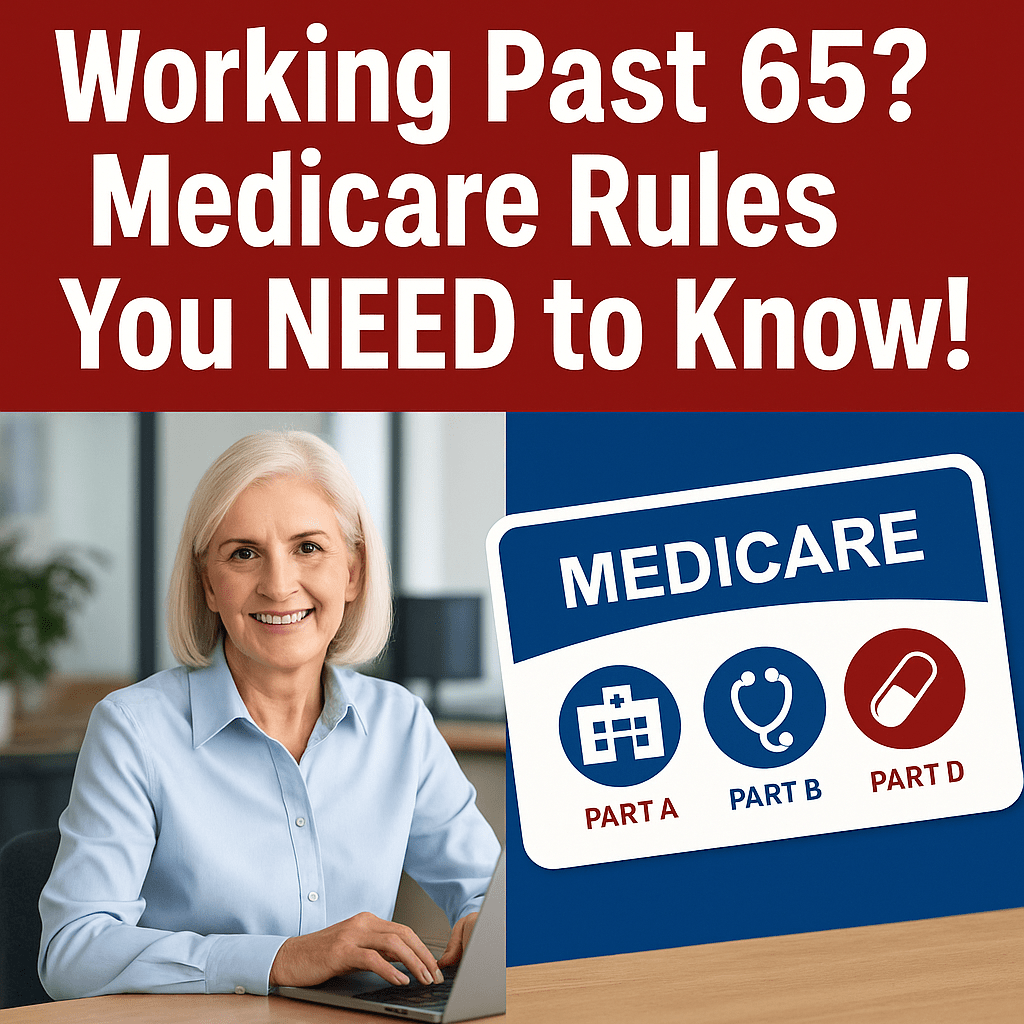These days, 65 isn’t what it used to be.Many people are working well beyond their 65th birthday — whether for financial reasons, to stay busy, or simply because they love what they do.
But if you’re working past 65, there’s one thing you don’t want to ignore: Your Medicare options.
Medicare works a little differently when you’re still employed, and if you don’t know the rules, it’s surprisingly easy to make costly mistakes — penalties that can stick with you for life.
So let’s walk through it all, in plain English:
- How Medicare works with employer health insurance
- When you should (or shouldn’t) enroll
- What happens with COBRA
- How Special Enrollment Periods work
- What proof of coverage you need to avoid penalties
- And answers to the 10 most common questions I hear as a Medicare broker
Why This Matters More Than Ever
Over 25% of Americans age 65–74 are still working — and that number is growing every year.
Many employers offer health plans that seem better than Medicare — but things aren’t always as simple as they appear.
If you’re not careful, you could end up paying permanent penalties, face coverage gaps, or lose access to certain benefits when you do transition to Medicare.
The good news? When you understand the rules, you can make smart choices and avoid headaches down the road.
How Medicare Works With Employer Group Health Insurance
Here’s the basic rule of thumb:
If your employer has 20 or more employees:
- You can delay enrolling in Medicare Part B (medical insurance) without penalty.
- Your group health plan pays first (primary), Medicare pays second (secondary) — if you enroll in Medicare.
- Many people choose to stay on their employer plan until they retire.
If your employer has fewer than 20 employees:
- Medicare becomes your primary insurance once you’re eligible.
- You should enroll in Medicare Part A and Part B to avoid paying out of pocket — your group plan may not cover costs Medicare would normally pay.
IIf your coverage is retiree coverage (not active employment):
- Medicare is your primary coverage — you should enroll in Part A and Part B.
Do You Have to Enroll in Medicare at 65?
If you have active employer coverage through an employer with 20+ employees, you do not have to enroll in Medicare Part B at 65 — you can delay it without penalty.
But here’s where it gets tricky:
If you delay Part B when you should not have — or if you rely on coverage like COBRA or retiree insurance — you can face a 10% permanent penalty on your Part B premium for every 12 months you should have had it.
Important: Why You Shouldn’t Rely on COBRA
COBRA is not creditable coverage for delaying Medicare.
This is one of the biggest mistakes I see:
- Many people think COBRA allows them to delay Medicare.
- It doesn’t — and the clock starts ticking on your Part B late enrollment penalty the moment you stop active employment.
If you take COBRA and don’t enroll in Part B, you can be hit with both a penalty and a gap in coverage when COBRA runs out.
Real-life example:
One of my clients was offered COBRA after retiring at 67. They assumed they could wait to enroll in Medicare until COBRA ended. When they came to me, they’d already missed their enrollment window — and were facing a permanent penalty and had to wait months for coverage to begin.
Moral of the story: Don’t rely on COBRA as a Medicare substitute.
Special Enrollment Periods: Timing Is Everything
When you leave employer coverage, you qualify for a Special Enrollment Period (SEP) — which gives you a limited time to enroll in Medicare Part B and Part D without penalty.
Key points:
- You have 8 months from the end of employer coverage to enroll in Part B.
- You have 63 days from the end of employer coverage to enroll in Part D (prescription drug coverage).
- If you miss this window, you’ll have to wait for the General Enrollment Period (Jan 1–Mar 31) — and face late enrollment penalties.
IMPORTANT: When you do enroll, you’ll need to show proof of prior creditable employer coverage to avoid penalties.
This means getting a letter from your employer or insurance carrier verifying that you had coverage through active employment.
No proof = penalties.
Medicare Enrollment Timing Tips
Here’s a smart timeline if you’re retiring soon:
- Talk to HR at least 3–4 months before leaving your job.
Ask for written proof of coverage (you’ll need it for Medicare). - Apply for Medicare Part B 2–3 months before your employer coverage ends.
This helps ensure no coverage gap - Stop contributing to your HSA (if applicable) 6 months before enrolling in Medicare.
Once you’re on any part of Medicare, you can’t contribute to an HSA.
What About HSAs?
If you’re still working and have a Health Savings Account:
- You can contribute to your HSA only if you are not enrolled in Medicare Part A or Part B
- Once you enroll in Medicare (even Part A), you must stop contributing to avoid tax penalties.
- You can still spend HSA funds on qualified medical expenses after enrolling.
Top 10 Questions Medicare Consumers Ask About Working Past 65
- Do I need to enroll in Medicare at 65 if I’m still working?
Not if your employer has 20+ employees and offers good coverage. - What if my employer coverage is very good — should I delay Medicare?
It depends. Some people enroll in Part A (usually free) and delay Part B if their group plan is excellent. - What if my employer has fewer than 20 employees?
You must enroll in Medicare — it will become primary. - How does Medicare coordinate with my group plan?
If your employer has 20+ employees: employer plan = primary, Medicare = secondary. - What happens if I stay on COBRA and delay Medicare?
You’ll face penalties and coverage gaps — always enroll in Medicare on time. - What is the penalty for late enrollment?
10% of your Part B premium for every 12-month period you delay. - What is a Special Enrollment Period and how does it work?
An 8-month window after your group coverage ends to sign up for Part B without penalty. - When should I stop contributing to my HSA?
At least 6 months before starting Medicare. - How do I avoid coverage gaps when retiring mid-year?
Apply for Medicare before your employer coverage ends to ensure seamless coverage - Can my spouse stay on my employer plan if I switch to Medicare?
Often yes — but confirm with your employer’s HR department.
Real-Life Story: Smooth Sailing With the Right Advice
A client of mine, Susan, planned to retire at 68. We worked together 4 months in advance to coordinate her Medicare enrollment. We requested proof of her employer coverage, timed her Part B application perfectly, and transitioned her to a great Medicare plan — with zero gaps in coverage and no penalties.
It pays to plan ahead — and to ask for expert guidance.
Final Thoughts: Get Personalized Help — Don’t Guess!
Here’s the bottom line:
There is no one-size-fits-all answer when working past 65. Every situation is unique, and the decisions you make today will affect your coverage — and your wallet — for years to come.
Want to avoid mistakes and penalties?
Want to ensure your transition from group insurance to Medicare is smooth and seamless?
That’s what I do every day. As an independent Medicare broker, I’ll help you navigate your options, compare plans, and handle the paperwork — so you can focus on enjoying life, not stressing about insurance.






